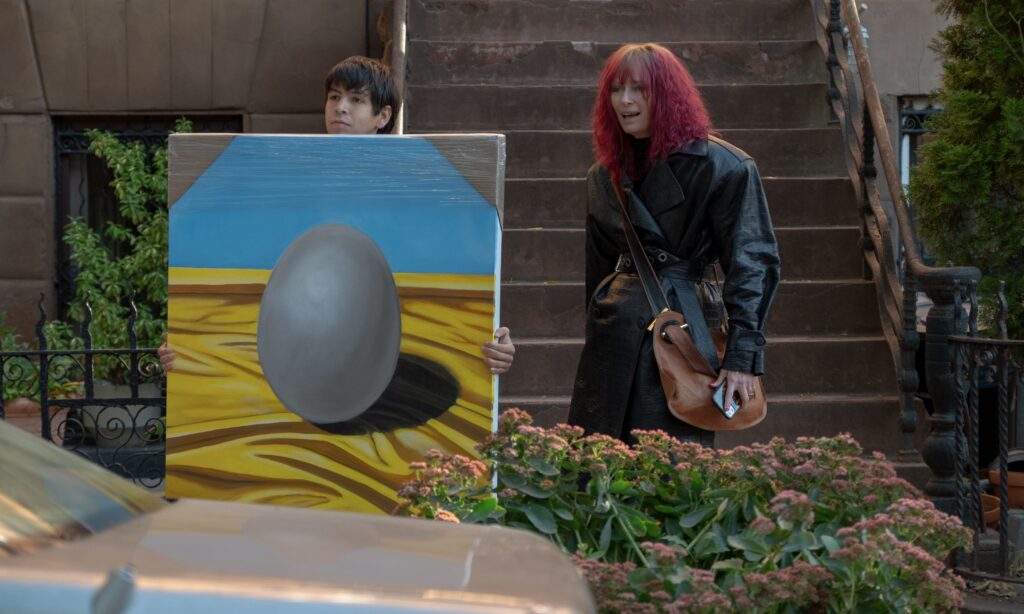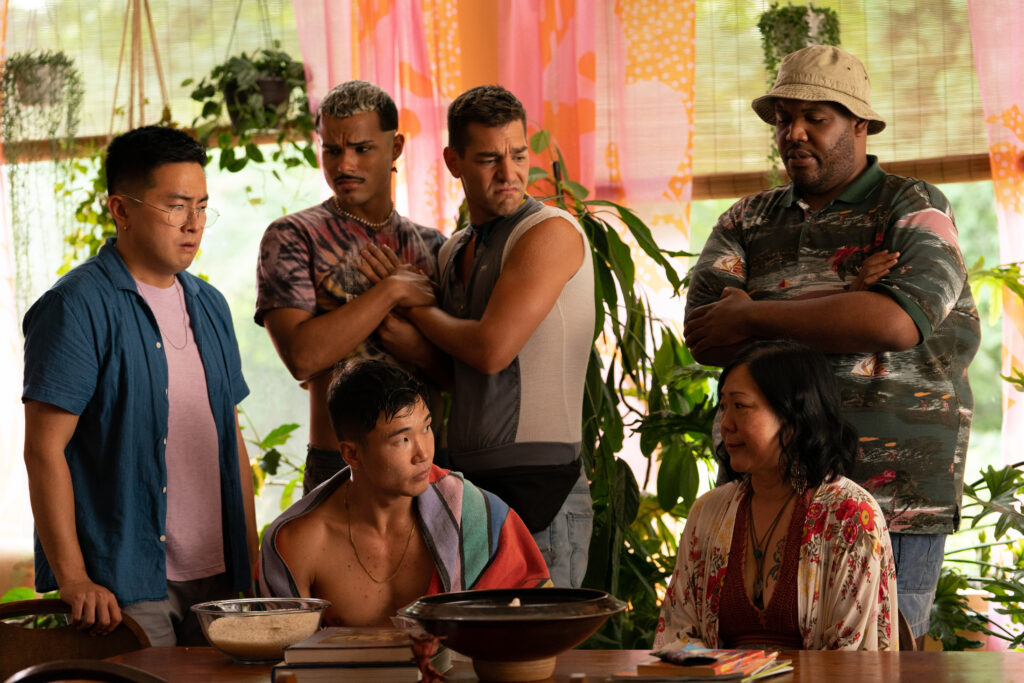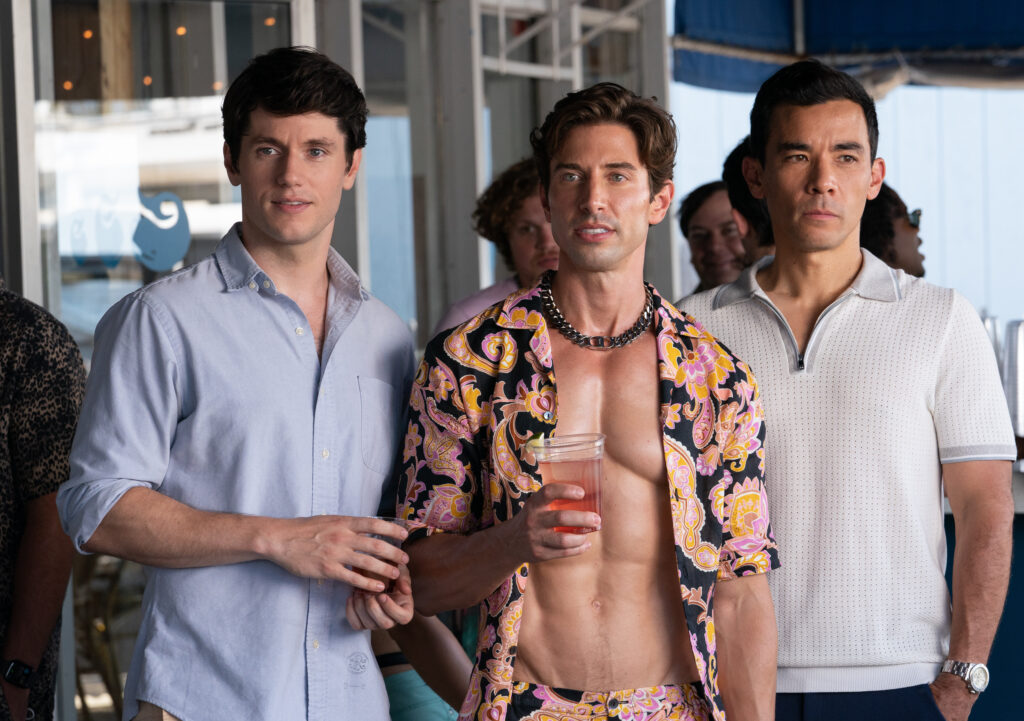March 1, 2024
by Carla Hay

Directed by Julia Torres
Culture Representation: Taking place in New York City and in Maine, the comedy/drama film “Problemista” features a racially diverse cast of characters (Latin, white, African American and Asian) representing the working-class, middle-class and wealthy.
Culture Clash: Cartisano, who died of a heart attack in 2019, at the age of 63, was sued several times and had many allegations that his camps illegally abused the children who were forced to be there.
Culture Audience: “Hell Camp: Teen Nightmare” will appeal primarily to people who are interested in documentaries that show how abuse and exploitation are excused or covered up, but some questions remain unanswered by the end of the movie.

“Problemista” has enough quirky charm to keep most viewers interested in what will happen next. It’s a unique comedy/drama about an aspiring toy designer from El Salvador, his immigration issues in New York City, and his eccentric artist boss. It’s not a spectacularly great movie, but it has entertaining and memorable moments for viewers who are interested in watching slightly weird independent films about artistic people. “Problemista” has some sci-fi elements that come to the forefront near the end of the movie.
Written and directed by Julio Torres, “Problemista” had its world premiere at the 2023 SXSW Film & TV Festival. Torres also stars in the movie as protagonist Alejandro Martinez, who was born and raised in El Salvador, by his single mother Dolores (played by Catalina Saavedra). Now in his 20s, Alejandro has been living in New York City, and working at low-paying jobs while trying to fulfill his goal of becoming a toy designer. His dream job would be to work at Hasbro, the company known for numerous popular toy brands, including G.I. Joe, Transformers, My Little Pony and Mr. Potato Head.
Isabella Rossellini is the movie’s unnamed voiceover narrator, who explains in the beginning of the film: “This is the story of Alejandro. His mother was an artist. And he was a project. She gave him everything, so he wished for everything. “Problemista” has occasional flashbacks to Alejandro’s childhood in El Salvador, with the flashbacks looking like Alejandro lived in a whimsical, playground-like fantasy land. In these flashbacks, Logan J. Alarcon-Poucel has the role of Alejandro as a boy.
Alejandro’s fantastical childhood memories are in stark contrast to his current realities: He lives in a small, drab apartment and is struggling to pay his bills with a job he doesn’t like. In the beginning of the movie, Alejandro gets a low-level job at a company called Freeze Corp., which is in the business of freezing the bodies of people who want to be unfrozen and resurrected in the future. Alejandro soon gets fired from Freeze Corp. for accidentally unplugging a backup generator.
Alejando is in the United States on a work visa, which means he can legally stay in the U.S. if he has an employer as a sponsor. He seeks guidance from an immigration attorney named Khalil (played by Laith Nakli), who has his own law practice. Khalil has some grim news for Alejandro: If Alejandro doesn’t find a work sponsor in one month, then Alejandro will be in danger of being deported. In the meantime, Alejandro has to find a way to make some fast cash because his rent and other bills are due.
It just so happens that a demanding, fast-talking and quick-tempered artist named Elizabeth Ascencio (played by Tilda Swinton) is looking for a freelance assistant. Elizabeth crossed paths with Alejandro because her husband Bobby (who is a painter artist) is a customer of Freeze Corp., a company that Elizabeth does not like. And so, when she hears that Alejandro was fired from Freeze Corp., Elizabeth hires Alejandro to be her assistant.
Elizabeth is unpleasantly neurotic, argumentative and difficult. A great deal of the movie is about the uneasy work relationship that Alejandro and Elizabeth have with each other. Alejandro has a “fake it ’til you make it” attitude about the job, such as when he pretends to Elizabeth that he knows how to use FileMaker Pro software on a computer, and he has to go to certain lengths to cover up this lie.
Bobby (who makes paintings of eggs) wants to do a gallery exhibit called “13 Eggs.” Elizabeth tells Alejando that she will be Alejandro’s work sponsor if Alejandro successfully helps her pitch this exhibit to a gallery. And so, there’s a long stretch of the movie where Alejandro has to track down all of Bobby’s paintings (some of which were given away or sold) for this exhibit.
Elizabeth and Bobby (who have homes in New York City and Maine) have an unconventional marriage, not just because of their age difference (she’s about 10 years older than he is) but also because they also have an open marriage and they don’t spend a lot of time together. She tells Alejandro that she and Bobby fell in love with each other because they are both people “who feel misunderstood.” Even though Bobby and Elizabeth have an open marriage, there are still jealousy issues. Elizabeth doesn’t like that Bobby has gotten very close to a woman named Dalia Park (played by Greta Lee), who is one of Bobby’s most promising students.
“Problemista” also shows some of Alejandro’s life when he’s not working. He gets a roommate named Bingham (played by James Scully), who likes to party. Alejandro doesn’t have a love interest in the movie, but it’s shown that he is gay or queer. Alejandro can’t get paid for his assistant job until Elizabeth officially becomes his work sponsor. When he runs low on money, he resorts to a desperate way to make some cash.
One of the movie’s quirks is showing fantasy sequences involving a character named Craigslist (played by Larry Owens), who appears to Alejandro in hallucinations that make Craigslist look like he’s in a disco nightclub or drag-queen ballroom. Craigslist gives advice and pep talks to Alejandro when Alejandro is feeling doubt and fear. Even though Alejandro is in his 20s, Alejandro often looks and acts like an insecure teenager. He has tendency to dress like a high school student, including wearing a backpack. He shuffles when he walks, and he often stammers in conversations with people.
“Problemista” has some pacing and tonal issues when the movie has an awkward balance of comedy and drama. The story also gets a little repetitive in showing Elizabeth’s negative outbursts and ranting. However, the performances in the movie (especially from Torres and Swinton) are compelling. And “Problemista” shows with compassion and some grittiness what it looks like to be a lonely immigrant with visa problems in America. It’s a life that is often lived in quiet desperation but gets to live out loud in a movie like “Problemista.”
A24 released “Problemista” in select U.S. cinemas on March 1, 2024, with an expansion to more U.S. cinemas on March 8, 2024.


